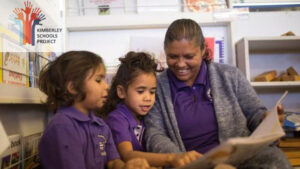Home » Commentary » Opinion » Countering Indigenous educational disadvantage
· Ideas@TheCentre
 For decades, and despite best intentions and considerable resourcing, there’s sadly been limited evidence of system-wide improvements in education outcomes for remote Indigenous students.
For decades, and despite best intentions and considerable resourcing, there’s sadly been limited evidence of system-wide improvements in education outcomes for remote Indigenous students.
However, armed with the right tools, there are scalable practices more teachers and schools can employ to mitigate educational disadvantage.
In Confronting Indigenous educational disadvantage: A Kimberley perspective I outline which practices are — and are not — working in some of Australia’s most challenging school conditions.
What really counts is what happens inside the classroom, especially arming teachers to deliver high impact pedagogy.
Ingredients for success include: commitment to direct and explicit instruction; a focus on early literacy; high expectations; a focus on attendance; integrated pre-schooling programmes; and community engagement.
Effective teaching in majority-Indigenous schools doesn’t require reinventing the wheel, but does demand doing away with some pedagogical ‘sacred cows’.
Tried and tested methods aren’t always promoted in teacher training, which tends to be dominated by discredited, but popular, constructivist approaches.
Putting the focus instead on instruction is counter to the beliefs of some educators, who assume catering for individuality is the key to motivating children to learn.
Ideological beliefs continue to dominate discussions on Indigenous education, often circulated by vocal critics who’ve never taught in remote communities.
The result is that children are pigeonholed into a racially-defined pedagogy, rather than an evidence-based one.
Schooling can’t be viewed in isolation, given the wider challenges faced in some remote communities. The sad truth is too many children are educationally vulnerable before they start school.
Limited exposure to books, poor vocabulary and underdeveloped spoken language conspire within a fragile family structure where hunger, poor health and unstable households hurt school attendance and learning.
It’s this pre-existing vulnerability that means ineffective teaching can’t be tolerated as an additional burden.
There should be a greater sense of urgency in redressing possible language vulnerability in early years, particularly if English is not spoken at home.
This, combined with comprehensive improvements in teacher training and professional development, should be the focus of education policymakers in efforts to close the educational gap.
Dr Lorraine Hammond is Associate Professor at Edith Cowan University and leads professional learning and coaching for teachers and school leaders in the Kimberley region.
Countering Indigenous educational disadvantage